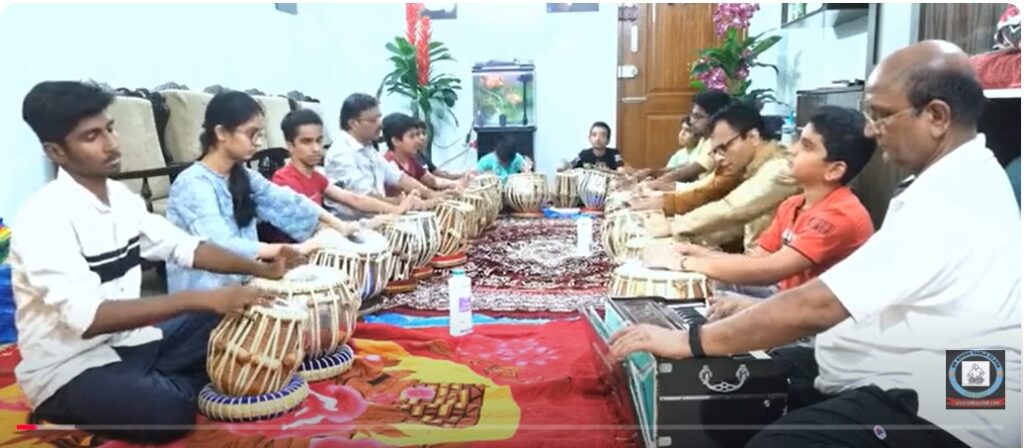Tabla is no-1 meditation and healing cure many psychological problems.Tabla: A Great Meditation and Healing Tool to Cure Psychological Problems,Music has always been a powerful tool for emotional expression and mental well-being. Among various musical instruments, tabla stands out not only as a rhythmical delight but also as a healing and meditative practice that can cure many psychological problems. The vibrations, hand movements, and rhythmic cycles of tabla create a deep sense of relaxation, making it an effective tool for meditation and therapy.
Tabla as a Meditation Tool
Meditation is known for calming the mind, reducing stress, and promoting inner peace. Playing tabla can be a meditative experience as it requires deep focus, rhythmic breathing, and coordination between the hands and mind. The repetitive nature of tabla compositions, such as thekas, kaidas, and tukras, helps in achieving a trance-like state, similar to traditional meditation techniques.
- Focus and Concentration: Tabla requires intense concentration to maintain rhythmic patterns, which naturally sharpens mental focus. This helps practitioners develop mindfulness—a key element of meditation.
- Breathing Synchronization: While playing tabla, breathing naturally aligns with the rhythm, creating a harmonious flow of energy, similar to pranayama (breathing exercises) in yoga.
- Vibrational Healing: The deep, resonant sounds of tabla create positive vibrations that stimulate the brain, helping to reduce anxiety and mental restlessness.
How Tabla Helps in Psychological Healing
Many psychological issues, such as stress, anxiety, depression, and emotional imbalance, can be managed through music therapy. The tabla’s rhythmic cycles can have a therapeutic impact on the mind and body in the following ways:
1. Reduces Stress and Anxiety
Playing tabla releases endorphins, the brain’s natural feel-good chemicals. The rhythmic beats act as a form of sound therapy, which lowers cortisol levels (stress hormone) and promotes relaxation. Many people find that after a tabla session, they feel lighter, happier, and more energetic.
2. Enhances Emotional Expression
Music is a universal language of emotions. Playing tabla allows an individual to channel their emotions through rhythm, whether it’s joy, sadness, or frustration. This expressive release prevents emotional suppression, which can lead to anxiety and depression.
3. Improves Cognitive Functions
Studies show that playing a musical instrument like tabla enhances brain functions, including memory, problem-solving, and decision-making skills. Tabla players develop strong neural connections, which can help in preventing cognitive decline and disorders like Alzheimer’s.
4. Helps with ADHD and Hyperactivity
Children and adults suffering from Attention Deficit Hyperactivity Disorder (ADHD) can benefit from tabla playing. The structured rhythmic patterns provide a sense of discipline and focus, helping individuals stay attentive and organized.
5. Boosts Self-Confidence and Social Connection
Learning and playing tabla gives a sense of achievement and self-worth. Performing in group settings or concerts enhances social interaction, reducing feelings of loneliness and isolation. Many music therapy programs use percussion instruments like tabla to build self-esteem in individuals battling depression.
Scientific Evidence Behind Music Therapy
Research in neuroscience and psychology supports the idea that rhythmic music, such as tabla playing, has a profound impact on brain waves. Studies show that:
- Binaural beats and rhythmic drumming synchronize brain waves, inducing a meditative state.
- Percussion therapy is used in treating PTSD (Post-Traumatic Stress Disorder) by helping individuals reconnect with their emotions.
- Music engages the right and left hemispheres of the brain, enhancing creativity and logic simultaneously.
How to Incorporate Tabla into Daily Life for Healing
If you are looking to use tabla as a meditation and healing tool, here are some simple steps:
- Start with Basic Rhythms: Learn simple taals like Teen Taal, Dadra, or Rupak to develop a rhythmic flow.
- Play with a Calm Mind: Set aside 10–15 minutes daily for tabla practice in a peaceful environment.
- Sync with Meditation: Combine tabla playing with deep breathing exercises or chanting mantras for enhanced spiritual healing.
- Use Tabla as Sound Therapy: Even if you don’t play, listening to tabla performances can provide a soothing effect on the mind.
Conclusion
Tabla is not just a musical instrument; it is a path to inner peace, meditation, and psychological healing. Its rhythmic cycles, hand movements, and vibrations create positive energy, reducing stress, anxiety, and other mental health issues. Whether you are playing or listening to tabla, the healing power of this instrument can transform your emotional and mental well-being.
If you are looking for a natural way to relieve stress and improve focus, consider adding tabla to your daily routine. Let the beats of tabla guide you towards a more balanced, peaceful, and joyful life.



